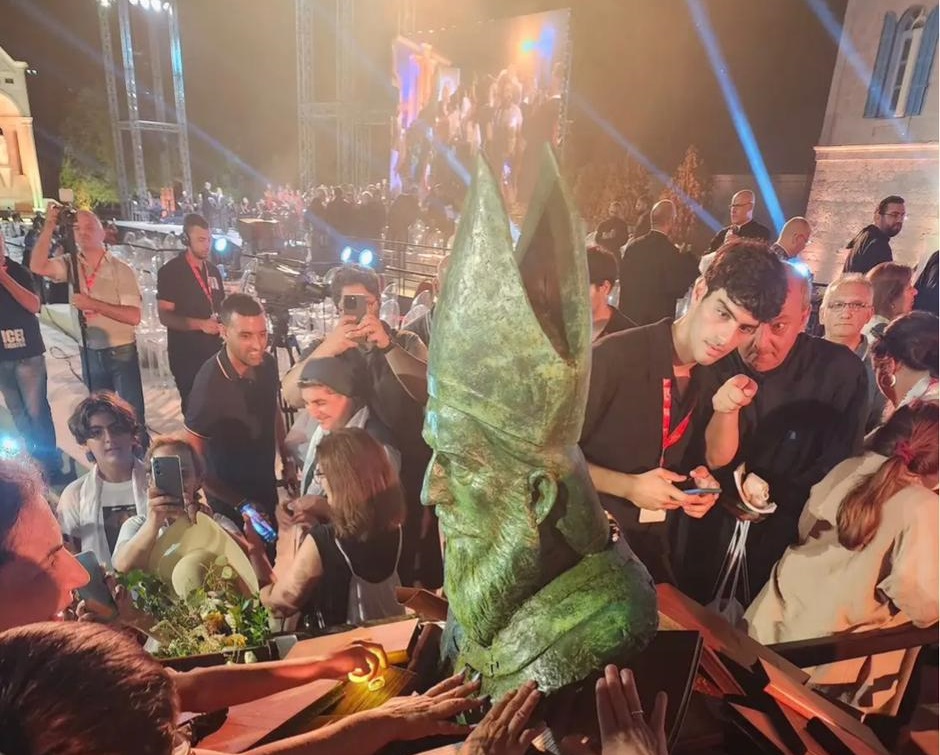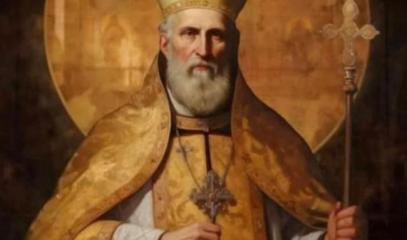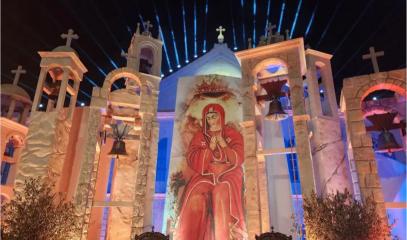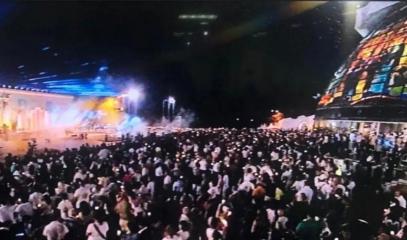Beatification of Patriarch al-Duwayhi at a most challenging time
The ceremony in Bkerké recognises the prelate who in the 17th century gave shape to the Maronite Church and built the country. In his homily, Card Semeraro quoted Pope Benedict XVI: "May Lebanon continue to be a place where men and women can bear [. . .] witness to the communion between people, [. . .] whatever their political, social, or religious standpoint.’”
Beirut (AsiaNews) – The Maronite Church beatified Patriarch Istifan al-Duwayhi,[*] a "pillar" and a model of pastoral charity, on Friday, 2 August, anniversary of his birth, during a grandiose evening ceremony at the patriarchal see in Bkerké.
Laid to rest alongside others in 1704 in the cave of Saint Marina, in the depths of the Kadisha (Holy) Valley, northern Lebanon, the patriarch’s remains were moved in 2008 to the Church of Saint George, in Ehden, his native village, whose residents yesterday could not contain their joy and jubilation.
Now any one can travel to the place and visit the tomb of the new blessed, whose feast day has been set for 3 May, the day of his death.
Ehden is also where he performed the miracle accredited by the Vatican for his beatification, when he instantly healed a woman suffering from HIV-negative polyarthritis.
The Maronite Patriarch, Bechara al-Rahi, concelebrated the Mass of beatification with the Prefect of the Congregation for the Causes of Saints, Card Marcello Semeraro, who came from Rome for the occasion, in the courtyard outside the Patriarchal See, in front of a crowd estimated at more than 10,000.
“The life of the new Blessed marks a turning point in the history of the Maronites. This is the time when they stopped taking and started giving," said Fr Youhanna Geha, a monk of the Lebanese Maronite Order, for AsiaNews.
Chosen for his intellectual precocity to study at the Maronite College in Rome, the boy, who was only 11 years old when he arrived in Rome, had an irreproachable academic career.
“At the end of his studies, he was asked to stay in Rome. Several other students at the Maronite College had given in to the temptation to remain in Europe, to serve at great universities or princely and royal courts," writes historian Tanios Noujeim. But al-Duwayhi insisted on going home to his community.
With him, the Maronite East opened up to the West, without merging into it or becoming "Latinised". Starting with him, and thanks to countless works, the Maronites wrote their history, including the succession of patriarchs tracing their existence back to Antioch and Saint John Maron (7th century).
Thanks to him, schools were opened and churches built. Thanks to him, the three Lebanese monastic orders were born. Thanks to him, the Maronite Church brought order to its liturgy, its music, and its songs.
Through his influential action, the Lebanese Synod of 1736 recommended the compulsory education of boys and girls. "By building up his Church, he built up Lebanon," said the office manager of the Congregation for the Causes of Saints.
The life of this man of God, elected patriarch at only 40 years old, victim of the vagaries of a Mount Lebanon dominated first by the Mamluks and then by the Ottomans, stumbling over the internal dissensions of the time, is punctuated by miracles of tenacity and supernatural help.
The most evoked by the faithful is the one that allowed him, at the age of 18, to recover the use of his eyes, worn out by reading, and an illness that forced him to interrupt his studies and return to his country.
It was the Virgin Mary who gave him back his sight, in exchange for a wish, which he hid from everyone, and which he upheld “with all the ease in the world", according to him, throughout his life. It is said that his sight was so miraculously restored that he was able to read in the moonlight!
The homily at the Mass of beatification, delivered by Archbishop Marcello Semeraro, did justice to this scholar and pastor of exceptional stature, who was the patriarch of his community for 30 years.
Archbishop Semeraro stressed above all his pastoral qualities, commenting on the Gospel of the Good Shepherd that Bishop Maroun Nasser Gemayel, author of a biography of the new blessed, read.
"What does the Lord mean? Was it necessary for him to specify that the good shepherd lays down his life for his sheep? I think so. The prophet Ezekiel had already spoken of the prophets who, instead of caring for the flock, are shepherds for themselves. Even today, unfortunately, these things happen.
“These people, instead of serving the common good, think about their own well-being. This is why Jesus speaks of the Good Shepherd. We are good when we nurture with our own heart the intention to do good and we really do it afterwards, through appropriate choices and acts."
However, Jesus goes further. “The afterlife, our blessed truly imitated it. He was a pastor who suffered for and with his flock. He did everything possible to defend it, protect it, and make it grow."
In the front row at the ceremony were Prime Minister Nagib Mikati, the Commander of the Lebanese Armed Forces General Joseph Aoun, as well as a host of political leaders and government officials, who could clearly hear these words, which stressed Lebanon’s abnormal situation, undermined by corruption and bad governance, without a president, and dragged into a war it does not want.
The Prefect of the Congregation for the Causes of Saints completed his message by citing a speech given by Pope Benedict XVI during his visit to Lebanon.
"When Pope Benedict XVI came here to Lebanon, he said that the interior of the Temple built by Solomon was made of cedar wood. Lebanon was present in the sanctuary of God, the Pope said. Patriarch al-Rahi will remember, because he was present.
"Pope Benedict added words that we can hear today with so much hope: ‘May Lebanon continue to be a place where men and women can live in harmony and peace with each other, in order to give the world not only a witness to the presence of God, the primary theme of this past Synod, but also a witness to the communion between people, the second theme of the Synod, whatever their political, social, or religious standpoint.’”
This message could not be timelier in a country where political differences have prevented the election of a new president since October 2022 and which risks being caught up in the whirlwind of a regional war that threatens to break out any day.
[*] Also known as Estephan or Étienne El Douaihy.
15/05/2019 16:35










.png)










